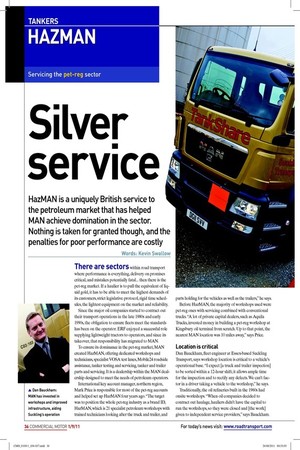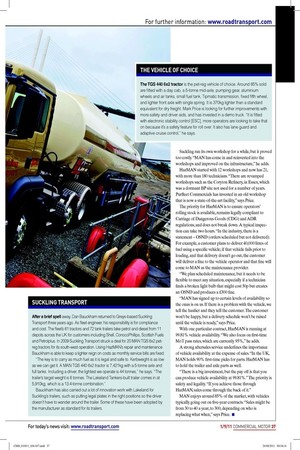Silver service
Page 31

Page 32

If you've noticed an error in this article please click here to report it so we can fix it.
HazMAN is a uniquely British service to the petroleum market that has helped MAN achieve domination in the sector. Nothing is taken for granted though, and the penalties for poor performance are costly
Words: Kevin Swallow
There are sectors within road transport
where performance is everything, delivery on promises critical, and mistakes potentially fatal... then there is the pet-reg market. If a haulier is to pull the equivalent of liquid gold, it has to be able to meet the highest demands of its customers, strict legislative protocol, rigid time schedules, the lightest equipment on the market and reliability.
Since the major oil companies started to contract out their transport operations in the late 1980s and early 1990s, the obligation to ensure leets meet the standards has been on the operator. ERF enjoyed a successful role supplying lightweight tractors to operators, and since its takeover, that responsibility has migrated to MAN.
To ensure its dominance in the pet-reg market, MAN created HazMAN, offering dedicated workshops and technicians, specialist VOSA test lanes, Mobile24 roadside assistance, tanker testing and servicing, tanker and trailer parts and servicing. It is a dealership within the MAN dealership designed to meet the needs of petroleum operators.
International key account manager, northern region, Mark Price is responsible for most of the pet-reg accounts and helped set up HazMAN four years ago. “The target was to position the whole pet-reg industry as a brand ID, HazMAN, which is 21 specialist petroleum workshops with trained technicians looking after the truck and trailer, and parts holding for the vehicles as well as the trailers,” he says.
Before HazMAN, the majority of workshops used were pet-reg ones with servicing combined with conventional trucks. “A lot of private capital dealers, such as Aquila Trucks, invested money in building a pet-reg workshop at Kingsbury oil terminal from scratch. Up to that point, the nearest MAN location was 10 miles away,” says Price.
Location is critical
Dan Bauckham, leet engineer at Essex-based Suckling Transport, says workshop location is critical to a vehicle’s operational base. “I expect [a truck and trailer inspection] to be sorted within a 12-hour shift; it allows ample time for the inspection and to rectify any defects. We can’t factor in a driver taking a vehicle to the workshop,” he says.
Traditionally, the oil refneries built in the 1960s had onsite workshops. “When oil companies decided to contract out haulage, hauliers didn’t have the capital to run the workshops, so they were closed and [the work] given to independent service providers,” says Bauckham. Suckling ran its own workshop for a while, but it proved too costly. “MAN has come in and reinvested into the workshops and improved on the infrastructure,” he adds.
HazMAN started with 12 workshops and now has 21, with more than 180 technicians. “There are revamped workshops such as the Coryton Reinery, in Essex, which was a dormant BP site not used for a number of years. Purleet Commercials has invested in an old workshop that is now a state-of-the-art facility,” says Price.
The priority for HazMAN is to ensure operators’ rolling stock is available, remains legally compliant to Carriage of Dangerous Goods (CDG) and ADR regulations, and does not break down. A typical inspection can take two hours. “In the industry, there is a statement – OSND (orders scheduled but not delivered). For example, a customer plans to deliver 40,000 litres of fuel using a speciic vehicle; if that vehicle fails prior to loading, and that delivery doesn’t go out, the customer will deliver a ine to the vehicle operator and that ine will come to MAN as the maintenance provider.
“We plan scheduled maintenance, but it needs to be lexible to meet any situation, especially if a technician inds a broken light bulb that might cost 50p but creates an OSND and produces a £300 ine.
“MAN has signed up to certain levels of availability so the onus is on us. If there is a problem with the vehicle, we tell the haulier and they tell the customer. The customer won’t be happy, but a delivery schedule won’t be raised until the vehicle is ready,” says Price.
With one particular contract, HazMAN is running at 99.81% vehicle availability. “We also focus on irst-time MoT pass rates, which are currently 95%,” he adds.
A strong aftersales service underlines the importance of vehicle availability at the expense of sales. “In the UK, MAN holds 90% irst-time picks for parts. HazMAN has to hold the trailer and axle parts as well.
“There is a big investment, but the pay off is that you can produce vehicle availability at 99.81%.” The priority is safety and legality. “If you achieve those through HazMAN, sales come through the back of it.”
MAN enjoys around 85% of the market, with vehicles typically going out on ive-year contracts. “Sales might be from 30 to 40 a year, to 300, depending on who is replacing what when,” says Price. ■














































